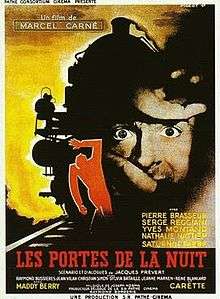Gates of the Night
Gates of the Night (French: Les Portes de la nuit) is a 1946 French film that was directed by Marcel Carné. It starred Serge Reggiani and Yves Montand. The script was written by Carné's long-time collaborator Jacques Prévert. The film made its debut in the United States four years after its official release in France.[1][2] It introduced the much-recorded popular song "Autumn Leaves" (French: Les feuilles mortes).
| Gates of the Night | |
|---|---|
 Theatrical release poster | |
| Directed by | Marcel Carné |
| Screenplay by | Jacques Prévert |
| Starring | Yves Montand, Serge Reggiani |
| Music by | Joseph Kosma |
| Cinematography | Philippe Agostini |
| Edited by | Jean Feyte |
Production company | |
Release date | 1946[1] |
Running time | 120 minutes |
Plot
In the winter of 1945, immediately after the liberation, Jean Diego (Montand), a member of the French underground during World War II, meets Raymond, one of his comrades in arms who was believed to have succumbed in battle. On the night of that meeting, Jean encounters a homeless man named "Destiny" (Jean Vilar), whose predictions about him finding the woman of his life will not be too far from reality. Jean soon starts a liaison with Malou (Nathalie Nattier), a young woman who is married to a rich man. The next hours of his and Malou's lives are underscored by extreme, dramatic events; however, as the clochard (homeless person) predicted, they find their way out of the struggle and are able to move on, leaving behind wartime and its dangers.[1][2][3] Malou is shot and killed by her husband.
Cast
- Yves Montand as Jean Diego
- Pierre Brasseur as Georges
- Serge Reggiani as Guy
- Nathalie Nattier as Malou
- Saturnin Fabre as Mr. Sénéchal, the father of Malou and Guy
- Jean Vilar as "Destiny", the clochard
- Raymond Bussières as Raymond Lécuyer
- Sylvia Bataille as Claire Lécuyer
Reception
Les Portes de la nuit was released in the United States four years after it was first shown in France, where this psychological urban drama, especially due to its depiction of post-war Paris and close-to-dejected characters did not break the box office. It has been said that this is not Yves Montand's best performance, probably because this was only his second film. Overall, Les Portes de la nuit has narrative weaknesses regarding the plot; however, its settings are considered to be fascinating.[1][4] Unlike the more celebrated and popular La Bataille du rail released that same year, which depicts France as united in noble resistance to German occupation, Les Portes de la nuit is noteworthy for its honest acknowledgement of French collaboration with the enemy, as embodied by Serge Reggiani's character Guy.
References
- "Les Portes de la nuit". The New York Times.
- "Les Portes de la nuit". Le Figaro. Archived from the original on 2012-03-19.
- "Jacques Prèvert". Editions Enoch.
- "Les Portes de la nuit". Time Out Magazine. Archived from the original on 2012-10-18.